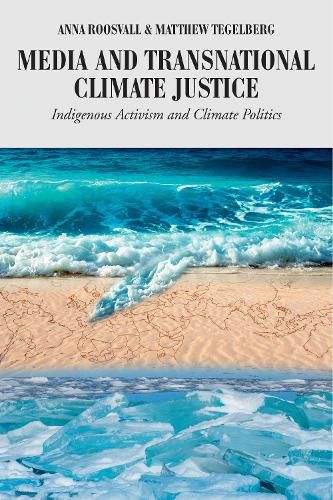Readings Newsletter
Become a Readings Member to make your shopping experience even easier.
Sign in or sign up for free!
You’re not far away from qualifying for FREE standard shipping within Australia
You’ve qualified for FREE standard shipping within Australia
The cart is loading…






This title is printed to order. This book may have been self-published. If so, we cannot guarantee the quality of the content. In the main most books will have gone through the editing process however some may not. We therefore suggest that you be aware of this before ordering this book. If in doubt check either the author or publisher’s details as we are unable to accept any returns unless they are faulty. Please contact us if you have any questions.
Media and Transnational Climate Justice captures the intriguing nexus of globalization, crisis, justice, activism and news communication, at a time when radical measures are increasingly demanded to address one of the most pressing global issues: climate change. Anna Roosvall and Matthew Tegelberg take a unique approach to climate justice by focusing on transnational rather than international aspects, thereby contributing to the development of theories of justice for a global age, as well as in relation to media studies. The book specifically explores the roles, situations and activism of indigenous peoples who do not have full representation at UN climate summits despite being among those most exposed to injustices pertaining to climate change, as well as to injustices relating to politics and media coverage. This book thus scrutinizes political and ideological dimensions of the global phenomenon of climate change through interviews and observations with indigenous activists at UN climate summits, in combination with extensive empirical research conducted on legacy and social media coverage of climate change and indigenous peoples. The authors conclude by discussing transnational solidarity and suggest a solidarian mode of communication as a response to both the global crisis of climate change and the broader issues of injustice faced by indigenous peoples regarding redistribution, recognition and political representation.
$9.00 standard shipping within Australia
FREE standard shipping within Australia for orders over $100.00
Express & International shipping calculated at checkout
This title is printed to order. This book may have been self-published. If so, we cannot guarantee the quality of the content. In the main most books will have gone through the editing process however some may not. We therefore suggest that you be aware of this before ordering this book. If in doubt check either the author or publisher’s details as we are unable to accept any returns unless they are faulty. Please contact us if you have any questions.
Media and Transnational Climate Justice captures the intriguing nexus of globalization, crisis, justice, activism and news communication, at a time when radical measures are increasingly demanded to address one of the most pressing global issues: climate change. Anna Roosvall and Matthew Tegelberg take a unique approach to climate justice by focusing on transnational rather than international aspects, thereby contributing to the development of theories of justice for a global age, as well as in relation to media studies. The book specifically explores the roles, situations and activism of indigenous peoples who do not have full representation at UN climate summits despite being among those most exposed to injustices pertaining to climate change, as well as to injustices relating to politics and media coverage. This book thus scrutinizes political and ideological dimensions of the global phenomenon of climate change through interviews and observations with indigenous activists at UN climate summits, in combination with extensive empirical research conducted on legacy and social media coverage of climate change and indigenous peoples. The authors conclude by discussing transnational solidarity and suggest a solidarian mode of communication as a response to both the global crisis of climate change and the broader issues of injustice faced by indigenous peoples regarding redistribution, recognition and political representation.